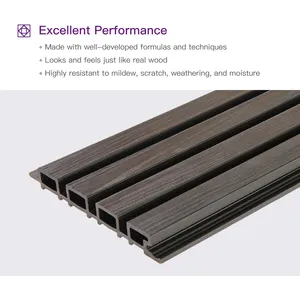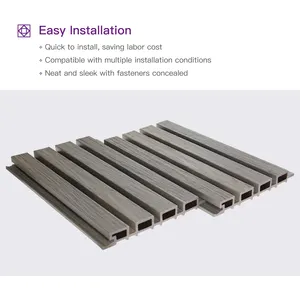(105144 products available)






































































































































































































































Wholesale wood paneling is a decorative covering for walls and sometimes ceilings, made from various types of wood. It serves both aesthetic and functional purposes, adding warmth, character, and a sense of luxury to a space while offering protection and insulation. Wood paneling for sale comes in several types, which are detailed below:
Solid Wood Paneling
This type of paneling is made from solid wood. It is more durable and long-lasting than other types of paneling. Because of this, it can be more expensive. It also needs more care and work to be put on the walls. There are different styles of solid wood paneling. Strip paneling has long, thin pieces of wood called strips. Tongue and groove paneling is made from strips of wood that fit together like a puzzle with grooves and tongues. Beadboard paneling has wood with beads on it that go vertically or horizontally. V-groove paneling has wood with V-shaped grooves. Wainscoting is solid wood paneling that only goes partway up the wall. These different styles allow people to choose solid wood paneling that fits the look of their room.
Veneer Paneling
Veneer paneling consists of a thin layer of real wood glued onto a less expensive material. It looks like solid wood but costs less money. This makes it a more affordable choice for covering walls. Veneer paneling comes in different types based on how the wood grain looks. Flat grain veneer has a smooth, even pattern. Vertigo veneer has a striped pattern that goes up and down. Rift cut veneer has the wood cut in a rift pattern, which makes it very straight and neat. Quarter sawn veneer is cut at a 90-degree angle, so the grain is tight and even. These different grain types allow people to pick veneer paneling that matches the style and feel of their room.
Engineered Wood Paneling
Engineered wood paneling is made from wood that is recycled and engineered into panels. It uses less of the wood than solid wood paneling, which is better for the environment. Engineered wood paneling also costs less money because it uses less wood. This makes it a more affordable choice for covering walls. Engineered wood paneling comes in different types based on how the wood grain looks. Full grain paneling shows the natural wood grain. Hand scraped paneling has the surface texture from being scraped by hand. Distressed paneling looks purposely rough, as if the wood has been worn down. Smooth paneling has a sleek, clean surface. These different textures allow people to pick engineered wood paneling that matches the style and feel of their room.
Enhancing Aesthetics
Wholesale wood wall paneling comes in different types that are suitable for various applications. For instance, structural panels are ideal for enhancing the appearance of walls, ceilings, and decorative structures. In addition, it offers different functional options. This includes enhancing the overall aesthetics of a room, offering warmth and a classic touch. Also, it features different textures, colors, and grain patterns. This allows customization to complement various interior designs. This could range from modern to traditional styles.
Insulation and Energy Efficiency
Wholesale wood paneling is a popular choice for homeowners looking for energy-efficient solutions. This is because it provides excellent thermal insulation. It helps to keep homes warm in the winter and cool in the summer. This not only makes homes more comfortable but also reduces energy bills. Some types of engineered wood, such as MDF panels, offer superior insulation properties. This makes them a great choice for eco-friendly building projects.
Durability and Longevity
Wholesale wood paneling is popular for its durability and long life. Solid paneling types are known for their strength and ability to withstand everyday wear and tear. This means they won't easily dent or scratch, which keeps them looking great for years. Even though engineered wood comes from bonded wood fibers, it offers similar durability to solid wood. Additionally, wood is repairable. This means that, unlike other materials, wholesale wood paneling can be easily repaired in case of damage, enhancing its longevity.
Environmental Sustainability
Wood is a renewable resource. This means that it can be replaced over time as trees grow. This makes wholesale wood paneling out of wood more sustainable than other types of paneling made from non-renewable resources. Additionally, wood stores carbon dioxide from the atmosphere. This is important in the fight against climate change. Using wood paneling in homes and buildings helps to keep carbon dioxide out of the atmosphere, which is good for the environment.
Versatility in Design
One of the key advantages of wholesale wood paneling is its versatility. It comes in different types, such as solid wood, engineered wood, veneer, and reclaimed wood. Each type offers unique design possibilities. For instance, solid wood paneling provides a classic, timeless look. At the same time, engineered wood paneling offers sleek, modern aesthetics. Additionally, wood paneling can be customized. It can be finished with paint, stains, or left natural, allowing for a wide range of color options.
When buying wholesale paneling, it is important to consider several factors to ensure the product meets the customers' needs. Here are some of the key factors a buyer should consider:
Consider the Type of Wood Paneling
There are several types of wood paneling, such as beadboard paneling, tongue and groove paneling, shiplap paneling, and wainscoting wood paneling. Each type serves a different purpose and has a unique installation process. For example, shiplap is ideal for a rustic look, while beadboard is excellent for a cottage-style finish. Therefore, the buyer should look at the types of wood paneling to determine the one that suits their customers' preferences and needs.
Check the Wood Paneling Finish
Wholesale wood paneling comes in different finishes, such as stained, painted, or natural. The finish affects both the appearance and maintenance of the wood. For example, stained paneling may require less maintenance than a painted paneling. Therefore, it is important to check the finish to ensure it matches the style and maintenance requirements of the customers' target market.
Evaluate the Quality of the Wood Paneling
The quality of the wood paneling directly affects its durability and performance. Buyers should look at the wood species, such as oak, pine, or cedar, and the construction methods used to create the paneling. Solid wood paneling is generally of higher quality than engineered wood paneling. Therefore, it is important to evaluate the quality to ensure it meets the standard required by the wholesale buyers.
Consider the Price of the Wood Paneling
Wholesale buyers are always looking for products that offer value for money. They should consider the price of the wood paneling to ensure it falls within their budget. However, it is also important to balance price with quality. A very cheap wood paneling may be of poor quality and may not last long. On the other hand, a highly priced paneling is not necessarily of good quality. Therefore, it is important to strike a balance between the two.
Q1: What is the most cost-effective type of wholesale wood paneling?
A1: Massaranduba is a relatively cheaper wood commonly used in paneling. It provides decent weather resistance and has a reddish-brown color.
Q2: What are the most popular types of wholesale wood paneling?
A2: Pine and cedar are the most popular types of wholesale wood paneling. They are widely available, affordable, and easy to work with. Their aesthetic appeal makes them a popular choice for both accent walls and ceilings.
Q3: What is the most durable type of wholesale wood paneling?
A3: The most durable types of wood panels are those from hardwood trees. This includes oak, maple, and mahogany. Panels from these wood species are not only long-lasting but also resistant to dents and scratches.
Q4: What are the disadvantages of wood paneling?
A4: Wood paneling is often considered a double-edged sword in the interior design world. While it offers the advantage of timeless elegance and natural warmth, it also comes with some notable disadvantages. One of the main disadvantages of wholesale wood paneling is that it is susceptible to moisture damage. Additionally, it is prone to scratching, requires regular maintenance, and is not ideal for all interior spaces.
Q5: What is the trend of wood paneling?
A5: One of the trending wood paneling design trends is the use of reclaimed or sustainably sourced wood. This aligns with the growing interest in eco-friendly design practices. Another trending design concept is accent walls. Here, wholesale wood paneling is used to create a focal point in a room. This is done by using different paneling styles, textures, or colors. People are also integrating wood paneling with other materials. For instance, combining wood with stone or metal to achieve a balanced and visually appealing interior design.